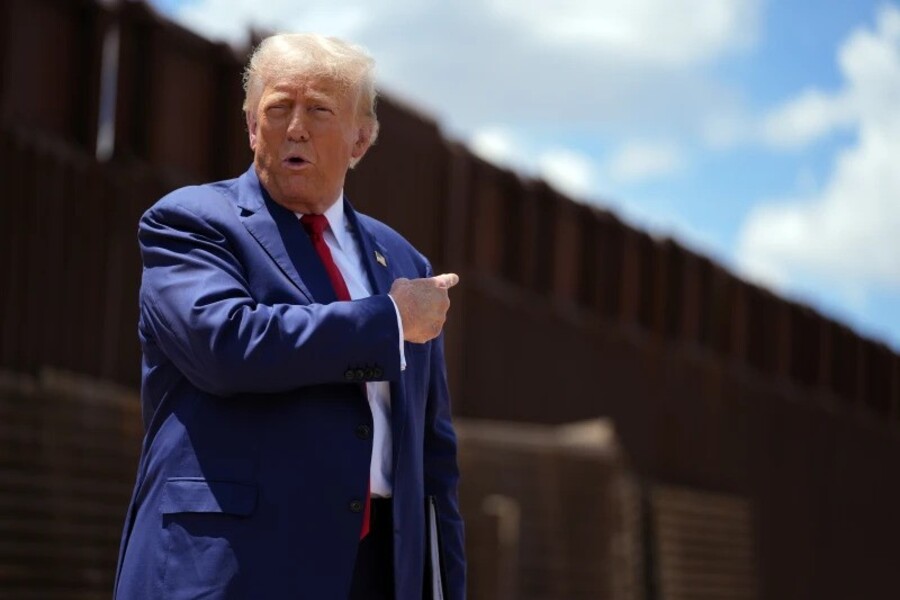Tom Homan, the Trump administration’s top border advisor, stated Sunday that the administration will comply with court orders regarding controversial deportation flights carried out under the Alien Enemies Act, despite legal questions surrounding the removal of Venezuelan migrants to El Salvador.
The statement comes after a federal judge in Washington, Judge James Boasberg, began examining whether the Trump administration violated a court order that temporarily halted deportation flights. Reports emerged last week that a deportation flight carrying Venezuelan detainees departed for El Salvador even after Judge Boasberg’s ruling, prompting scrutiny over the administration’s adherence to legal process.
Appearing on ABC’s This Week, Homan denied any defiance of court orders and maintained that all individuals on the flight were gang-affiliated. “That plane removed 240 terrorists from the United States,” Homan claimed, asserting that most of the deportees were members of Tren de Aragua (TDA)—a Venezuelan gang designated by the Trump administration as a terrorist organization.
However, family members and legal representatives of several deported individuals have publicly challenged those assertions, insisting their relatives were not affiliated with any gang. Despite repeated questioning, Homan declined to provide specific evidence supporting the administration’s designations.
At the center of the controversy is whether the Trump administration defied a judicial order by allowing a deportation flight to proceed. Judge Boasberg had issued a temporary restraining order blocking deportations under the Alien Enemies Act, citing ongoing litigation. The administration allegedly proceeded with deporting Venezuelan nationals after that order. Critics argue that doing so violated the court’s instructions. In response, Homan maintained that all actions were in line with federal law and national security priorities.
“This case is in litigation through the Alien Enemies Act and we’ll abide by the court order as litigated,” Homan said. “But my point was, despite what [Judge Boasberg] thinks, we’re going to keep targeting the worst of the worst.”
The administration’s use of the Alien Enemies Act—a statute originally enacted in 1798 to authorize the detention or deportation of nationals from enemy countries during wartime—has raised constitutional concerns. Critics argue that using the law in modern immigration enforcement bypasses due process protections.
When asked about individuals with no criminal records being deported, Homan responded that gang affiliations are not always reflected in public databases. “A lot of gang members don’t have criminal histories. Just like a lot of terrorists in this world, they’re not in any terrorist database,” he said. “We only know what’s in databases based on investigations.”
Homan defended the administration’s methods for identifying gang members, stating that designations were based on a combination of intelligence reports, undercover operations, and field investigations by U.S. Immigration and Customs Enforcement (ICE).
The absence of due process in some of these deportations has become a point of contention. Immigration attorneys say some individuals were removed without an opportunity to contest the government’s claims. One high-profile case involves Jerce Reyes Barrios, whose attorney says he was deported based on a tattoo of the Real Madrid soccer team’s logo. According to his lawyer, Barrios has never been charged with a crime nor had any gang affiliations.
When asked whether the administration would release evidence on deportees to substantiate the claims, Homan stated: “That would be litigated in the courts… I’m not going to get into every specific case.” He noted that ICE officials had vetted each deportee and confirmed their affiliations with TDA. “Every Venezuelan migrant on that flight was a TDA member based on numerous criminal investigations,” Homan said.
The Trump administration’s immigration policy has expanded beyond traditional enforcement tactics to include significant military deployment. As of this week, more than 10,000 U.S. troops are assisting at the southern border, alongside two Navy destroyers patrolling maritime routes. When questioned about the need for such military presence—especially as border crossing numbers have dropped—Homan explained the move as a precautionary measure.
“As we secure the southern border, some of these groups are going to take to maritime routes,” he said. “We’ve got the Coast Guard, CBP maritime patrol, and now the Navy out there securing those waters.” The administration argues the military’s presence serves as a deterrent against organized criminal operations and smuggling attempts through alternative entry points.
The controversy over the deportation flight is unfolding amid growing tension between the executive branch and the judiciary. Former President Trump recently criticized Judge Boasberg, labeling him “crooked” and calling for his impeachment. Despite the administration’s pledge to follow court orders, Homan’s rhetoric has at times suggested otherwise. Last week, he was quoted saying, “I don’t care what judges think.” On Sunday, he clarified the comment, saying it referred specifically to this case.
Nonetheless, civil rights advocates remain concerned about the potential erosion of legal norms. “This isn’t just about border enforcement,” one immigration attorney said. “It’s about whether the government can label someone a terrorist, deport them, and never have to prove it in a court of law.”
Legal analysts expect the coming weeks to be pivotal. Judge Boasberg is continuing to examine whether the administration violated his restraining order, and immigrant rights organizations are preparing legal challenges on behalf of deportees. Meanwhile, the Trump administration remains committed to using the Alien Enemies Act as part of its broader immigration enforcement strategy—asserting it as a legitimate national security tool amid rising concerns over gang violence and criminal infiltration.
“We’re not making this up,” Homan said. “The Alien Enemies Act is a federal statute enacted by Congress and signed by a president. That’s our litigation.”
With lawsuits mounting, public pressure growing, and bipartisan scrutiny on Capitol Hill, the administration now faces a balancing act between asserting national security priorities and respecting constitutional protections.
